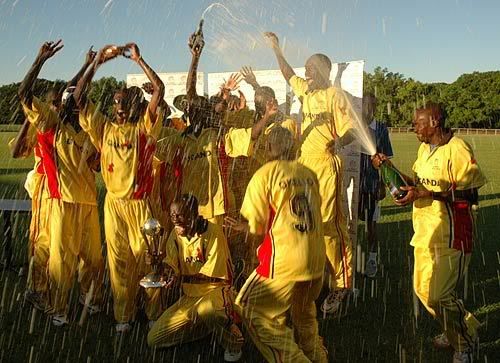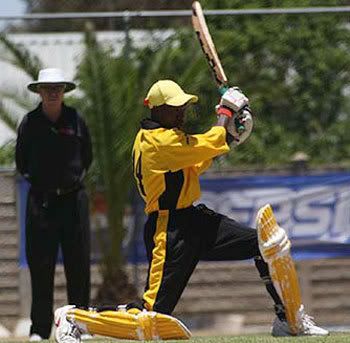
The Uganda national cricket team is the team that represents the country of Uganda in international cricket matches. Having previously been part of the combined East African and East and Central African teams, they became an associate member of the International Cricket Council in their own right in 1998. They began to play international cricket in 1951/52 when they first took part in a triangular tournament against regional rivals Kenya and Tanzania (then Tanganyika).
They have competed in the ICC Trophy on two occasions, in 2001 and 2005. They won Division Three of the World Cricket League in Darwin, Australia in 2007, qualifying them for Division Two of the same tournament towards the end of 2007, which also qualified them for a spot on the ICC's High Performance Program.
History:
East Africa team:
Uganda combined with their regional rivals Kenya and Tanzania to form the East Africa team. The first known match for this team was against a South African "Non-Europeans" team captained by Basil D'Oliveira in September 1958 in Nairobi, with the visitors winning by seven wickets. East Africa became an associate member of the ICC in 1966 and India toured the following year, winning a match against Uganda by 6 wickets before a first-class match against East Africa in Kampala which India won by 8 wickets.
East Africa toured England in 1972 and the Marylebone Cricket Club played a first-class match against East Africa in January 1974, winning by 237 runs. The following year, East Africa played in the 1975 Cricket World Cup in England. After various warm-up games, including a 3 wicket win against Glamorgan, they played New Zealand, India and England in the World Cup itself, losing all three matches. The World Cup was followed by a first-class match against Sri Lanka at the County Cricket Ground, Taunton, which the Sri Lankans won by 115 runs. East Africa played in the ICC Trophies of 1979, 1982 and 1986, without qualifying for the World Cup from any of them.
Uganda continued playing their regular matches against Kenya and Tanzania, despite Kenya leaving the East Africa combination in and the triangular tournament became a quadrangular tournament in 1966 when Zambia joined in. From then until the tournament's end in 1980, Uganda won the tournament just once.
East and Central Africa cricket team:
The East Africa team left the ICC in 1989 and was replaced by the East and Central Africa team the same year. This new team was a combination of Malawi, Tanzania, Uganda and Zambia, and they took part in the ICC Trophy for the first time in 1990, also taking part in 1994, 1997 and 2001.
Setting out on their own:
Uganda left the East and Central Africa combination and became an associate member of the ICC in their own right in 1998. Their first international tournament was the 2001 ICC Trophy. After winning all five of their first round games, they lost a play-off match against the UAE for the right to enter the second stage of the tournament. The following year, they finished third in their group in the Africa Cup.
In 2004, Uganda played their first first-class matches in the ICC Intercontinental Cup against Kenya and Namibia, winning against Namibia. In August that year, they finished second to Namibia in the Africa Cricket Association Championships in Zambia. This qualified them for the following years ICC Trophy, in which they finished in twelfth and last place after losing to Papua New Guinea in their final play-off match. Earlier in the year, they again played against Namibia and Kenya in the 2005 ICC Intercontinental Cup, losing both games.
Present Day:
In January 2007, Uganda faced Bermuda and Canada as those two teams prepared for Division One of the World Cricket League in Nairobi. This also served as preparation for Uganda's visit to Darwin, Australia, for Division Three of the same tournament. They won their games against the Cayman Islands, Hong Kong and Tanzania before beating Papua New Guinea in the semi-final. They then beat Argentina in the final of the tournament.
Uganda's performance in the Division Three tournament means that they have gained a spot in the ICC's High Performance Program, and will now travel to Windhoek, Namibia towards the end of 2007 where they will face Argentina, Denmark, Oman and the UAE in addition to hosts Namibia. A top four finish in this tournament will qualify them for the 2009 ICC World Cup Qualifier, whilst a bottom two finish will mean that they play in Division Three again in 2009.
Uganda took part in a four-team Twenty20 tournament prior to the 2007 Twenty20 World Cup, playing games against Pakistan, Kenya, and Bangladesh in Nairobi. As expected, they lost against Pakistan and Bangladesh, losing but they stunned African rivals Kenya with a two-wicket win.
Their next matches were two one-day games against Bermuda, also in Nairobi, in October 2007. They surprised their more experienced rivals, going down by just seven runs after Nandikishore Patel and Danniel Ruyange scored half-centuries, before winning the second match by 43 runs with Joel Olwenyi scoring a half-century of his own.
Links to more information on Uganda Cricket:

*Acknowledgements to Wikipedia.org and owners of pictures and videos used.
















No comments:
Post a Comment